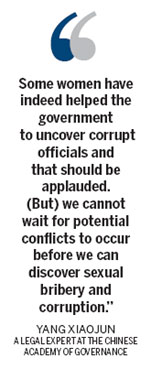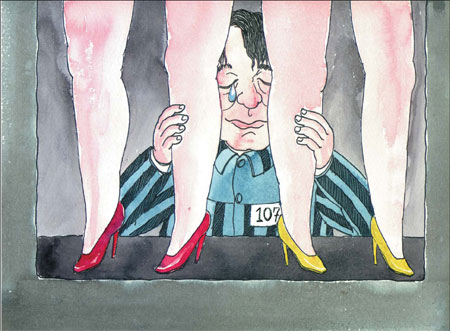Legal conundrum over sexual bribery
Updated: 2013-07-18 08:16
By Luo Wangshu in Chongqing and Cao Yin in Beijing (China Daily)
|
||||||||
|
Li Jingshan / for China Daily |

'Improper lifestyles' of corrupt officials reveal loopholes in the system, report Luo Wangshu in Chongqing and Cao Yin in Beijing.
Although a high-profile corruption case involving Lei Zhengfu ended on June 28 when the former Party chief of Beibei district in Chongqing was sentenced to 13 years in prison, revealing photos posted online of Lei and a young woman engaged in sexual activity are still a major topic of public discussion.
Lei is not the only high-level official toppled after an inappropriate relationship was investigated by the disciplinary authorities.
Former railways minister Liu Zhijun was given a suspended death sentence after being convicted on July 8 of corruption and abuse of power. The prosecutor's statement also pointed to his "improper lifestyle", which in China usually suggests being lecherous and living a life of debauchery.
Earlier this year, Yi Junqing, former head of the Party's Central Compilation and Translation Bureau, was removed from his post, also on charges of pursuing an "improper lifestyle", when a woman claiming to have been his mistress posted a detailed description of the alleged affair on the Internet. The post quickly went viral.
These so-called improper lifestyles are, in fact, a form of sexual bribery, a phenomenon that's increasingly common in corruption cases nowadays. However, they are hard to identify because of an anomaly in Chinese law, according to Yang Xiaojun, a legal expert at the Chinese Academy of Governance.
So far, the only cases that have come to light have featured male officials.
Tip of the iceberg
Cases such as those involving Lei and Liu are simply the tip of an iceberg and many officials are embroiled in similar activities. On a wider scale, just as government officials accept sexual favors as bribes, improper behavior is also rife in the world of business, Yang said.
The problem is that under current Chinese criminal law, there is no accurate definition of sexual bribery, let alone any means of identifying or punishing it, Yang said.

"Therefore, it's the right time to regard the provision of sexual services as a form of bribery and the definition of corruption should be widened to include this as soon as possible," he said, adding that he has been calling for the law to be revised for a number of years.
Yang's remarks sparked discussion among legal professionals, and a number of anti-corruption experts and law officers have voiced concern over a problem that appears to be becoming increasingly widespread. They also emphasized the difficulties faced by those charged with revising the law.
Sexual bribery is not a new phenomenon; it even exists in Chinese legend. Three of the fabled "Four Beauties" of ancient Chinese myth can be classified as sex bribes. One of the three, Xi Shi, for example, was gift from a defeated nation to its conquerors, while another, Diao Chan, was given away to two powerful men, a father and his adopted son. Diao eventually provoked a conflict within the family that resulted in the son murdering the father.
According to Chinese criminal law, the charge of bribery is concerned purely with financial reward. That means officials found to have accepted bribes of a sexual nature are dealt with by a disciplinary committee and not a criminal court.
As a result, both Liu and Lei were convicted of accepting monetary bribes, but neither was punished on counts of sexual bribery.
In the case of Liu, Beijing No 2 Intermediate Court said the former minister exploited his position to provide help to 11 people, including Ding Yuxin, board chairwoman of Boyou Investment Management Corp, and her relatives, to gain promotion and win lucrative contracts, all of which resulted in financial gain.
Although Internet observers claimed Ding, in return, provided Liu with women, the allegations were not confirmed by the court.
Liu Tienan, former vice-minister of the National Development and Reform Commission, was sacked in May after his former mistress provided a journalist with vital information about his corrupt practices - including accepting bribes, falsely claiming to hold universities degrees and leading an improper lifestyle.
Meanwhile, Sun Dejiang, a former lawmaker from Northeast China's Heilongjiang province, was arrested in January on charges of embezzling public funds, defrauding pension funds and conducting "improper relationships" with several women. He was removed from his post after a local journalist - who claimed Sun had forced her into maintaining an adulterous relationship with him - posted allegations about their relationship online.
Most of these improper lifestyles feature "brokers", usually company employees, who provide officials with prostitutes or pay for clients and officials to receive sexual services to win contracts for projects or to gain the "friendship" of the officials, in the hope of eventually reaping financial rewards.
"If we had a specific law to follow, I think the related problems could be alleviated," said Zhu Lijia, a professor at the Chinese Academy of Governance, who has long advocated including sexual bribery as an offence in the laws governing corruption.
Ren Jianming, director of the Clean Governance Research and Education Center at Beihang University, also supported calls to widen the definition of bribery with the aim of better identifying related crimes.
A tough challenge
The United Nations Convention against Corruption defines a bribe as an "improper benefit". According to Ren, that means "both sex and money can be seen as forms of bribery. In other words, the two are the same".
However, enacting a specific law or widening the definition of bribery will be difficult, according to Ren.
Yi Shenghua, a Beijing-based lawyer who has specialized in corruption cases for 10 years, said, "It's hard to identify, or obtain evidence of, sexual bribery," he said. "Corruption through money involves a financial transaction, but sexual bribery doesn't. It's a 'trade' between the official and the woman, which means it's not easy to expose unless the two fall out and the woman decides to go public about it."
Yi pointed out that the major challenge is to distinguish between a purely sexual transaction, instigated for the benefit of the person involved or for a third party, and an illicit affair based on genuine affection.
Sexual bribery also touches on morality. "Sometimes a person's actions can only be criticized from a moral standpoint and will not result in serious punishment," he added.
In addition to high-ranking officials who indulge in "improper love", those at the grassroots are not without fault, according to Yang Lin, director of the anti-graft department of the prosecuting authority in the Changping district of Beijing.
"Mistress-involved crimes have expanded from ministerial-level officials to medium- and even junior-level officials in recent years," Yang said, adding that the government, especially the disciplinary authorities, cannot afford to ignore or indulge such behavior.
For example, a high-ranking member of Beijing's municipal management bureau spent 1.25 million yuan on an apartment and car for his mistress and accepted bribes worth nearly 2 million yuan. Sexual bribery is not just an issue that relates to top officials and attention should also be paid to the problem when it affects the grassroots, she added.
However, formulating a specific law and widening the definition of bribery will take time, and experts and lawyers have pondered ways of accelerating a solution to the problem.
Zhu suggested the Party should impose harsher punishments on those discovered to have accepted bribes of a sexual nature, while Yi said judges should be encouraged to use their own discretion to hand out heavier penalties.
'Mistress anti-corruption'
The phrase "Mistress anti-corruption" is popular among Chinese netizens. It refers to the phenomenon of corrupt officials being brought down by their mistresses and many observers have praised its use as a tool to crack down on corruption.
Recently, a number of cases of corruption have been uncovered after the mistresses of the officials concerned let the cat out of the bag, either unwittingly or deliberately, but experts warned about an official extension through the use of agents provocateur.
For Yang, curbing corruption through the use of disgruntled mistresses is an effective, but morally dubious, practice and one that should not be encouraged.
Ren from Beihang University said anti-graft activity via mistresses should be discouraged because it would be inappropriate to tackle wrongdoing, such as bribery, through questionable means.
While Yang echoed Ren's view, he argued that the exposure of corruption by disaffected mistresses has been effective. "Some women have indeed helped the government to uncover corrupt officials and that should be applauded," he said.
Disclosures of this type usually occur as a result of a dispute between the lovers, so if the relationship remains strong, the chances that corruption will be uncovered are slim. "We cannot wait for potential conflicts to occur before we can discover sexual bribery and corruption," said Ren.
According to Ren, the key to cracking down on graft and sexual bribery lies in a stringent inspection mechanism and strong support from the public, who should report corrupt officials to the relevant authorities.
For Zhu, the important thing is to stamp out graft entirely: "The damage caused by sexual bribery is as important as that caused by financial corruption and sometimes the negative effects are even greater."
Contact the writers at luowangshu@chinadaily.com.cn and caoyin@chinadaily.com.cn
(China Daily USA 07/18/2013 page7)
Most Viewed
Editor's Picks

|

|

|

|

|

|
Today's Top News
GSK finance head not allowed to leave
Putin puts US ties above Snowden
DPRK demands Panama free seized ship
7.75% growth possible for 2013: IMF
Bomber as rock star?
More use smartphones to access the Internet
Mandela making dramatic progress: daughter
Manila playing for 'sympathy'
US Weekly

|

|














